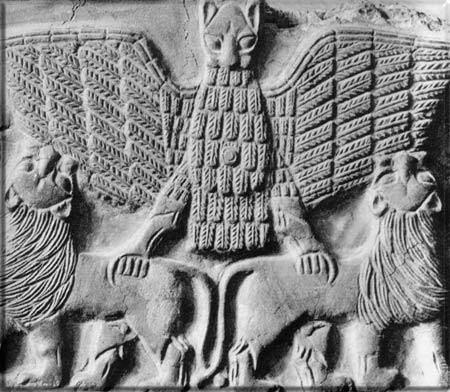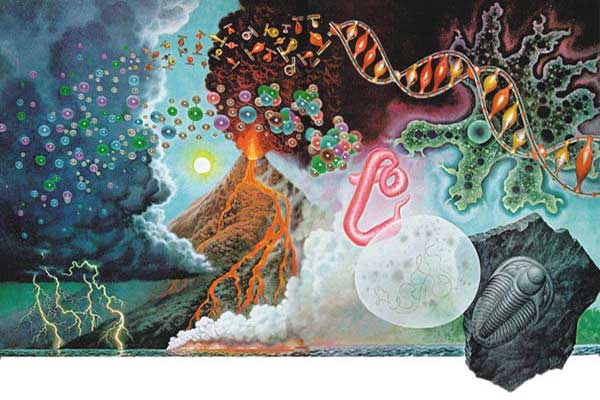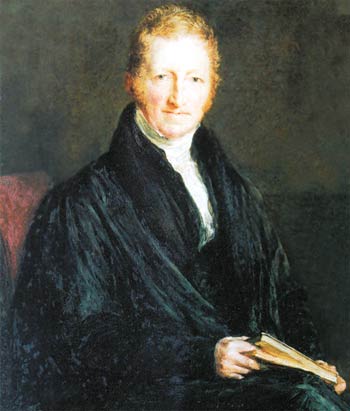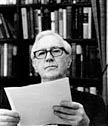Before we turn to the pain and disasters that Darwinism has brought to the world, let us take a brief look at its history. Many people believe the theory of evolution, first put forward by Charles Darwin, to be a theory based on firm scientific evidence, observation and experiment. Whereas, as the originator of the theory of evolution is not Darwin, so the source of the theory is not scientific proof.
At one period in Mesopotamia, when idol-worshipping religions had hegemony, superstitions and myths regarding the roots of life and the universe abounded: one of these was the belief "evolution." According to the Enuma-Elish epic, which dates back to the Sumerians, there was a raging flood, and from this the gods called Lahmu and Lahamu suddenly emerged. According to the superstition, these idols first created themselves and then, becoming universal, formed other matter and living creatures. In other words, according to Sumerian myth, life suddenly came into being from the non-living watery chaos, evolved and developed.
We can see that this belief shows a close accordance with the theory of evolution's claim that "living things developed and evolved from non-living things." From this we can see that the idea of evolution does not belong to Darwin, but originally to Sumerian idol-worshippers.
Later, the myth of evolution found more space to live in another idol-worshipping civilisation, Ancient Greece. Ancient Greek materialist philosophers counted matter as the only thing which existed. They turned to the myth of evolution, an inheritance from the Sumerians, to explain how living things came about. In this way, materialist philosophy and the myth of evolution came together in Ancient Greece. From there it was carried to the culture of Rome.
These two concepts, each a myth belonging to idol-worshipping cultures, reappeared in the 18th century. Some European thinkers who studied ancient Greek sources took a liking to materialism. The common feature of these thinkers was that they were opponents of religion.
 |
| A picture depicting the Sumerian water god. Just like the Sumerians, Darwinists believe that life emerged by coincidence from water. In other words, they see water as a god which created life. |
In this environment the first person to take the theory of evolution on in a detailed way was the French biologist Jean Baptiste Lamarck. In his theory, which would later be understood to be false, Lamarck proposed that all living creatures evolved from one another by small changes throughout their lives. One person who repeated Lamarck's claims, in a slightly different way, was Charles Darwin.
Darwin put forward this theory in his book The Origin of Species, which he published in England in 1859. In this book, the myth of evolution, which had come down from ancient Sumer, was put forward in some detail. He claimed that all species of living creatures came from one ancestor, born by chance in the water, and that they had grown different from one another by small changes which came about by coincidence.
Darwin put forward this theory in his book The Origin of Species, which he published in England in 1859. In this book, the myth of evolution, which had come down from ancient Sumer, was put forward in some detail. He claimed that all species of living creatures came from one ancestor, born by chance in the water, and that they had grown different from one another by small changes which came about by coincidence.
This claim of Darwin's did not win much general acceptance from the men of science of his time. Fossil experts in particular were aware that Darwin's claim was nothing but the product of a fantasy. But despite this Darwin's theory began to win more support from different circles as time passed. Because Darwin and his theory provided the missing foundation for the forces ruling in the 19th century.
 |
| Like idol-worshipping societies, Darwinists believe that life emerged by coincidence in water as a result of natural effects. According to this nonsensical claim, the unconscious atoms in the "primitive soup" in the picture joined together and decided to form living creatures. |
 |
| Compared to today, the microscopes available in the 19th century were quite primitive and, as in the picture, could only view cells as blots. |
In the period when Darwin published his book The Origin of Species and put forward his theory of evolution, science was very backward. For example, the cell, which is today known to possess a most complex system, was only visible as a blot through the primitive microscopes in use at the time. For this reason Darwin saw no problem in claiming that life came about by chance from non-living material.
In the same way, the insufficiency of the fossil record at that time made it possible for it to be claimed that living creatures had come about from each other by minute changes. Whereas today, it is certain that the fossil record, as we explained a short while above, offers not one piece of evidence to support Darwin's claim that living creatures had come about by developing from one another. Up until recently, evolutionists used to try to get over the dilemma facing them by saying, "It will be found one day in the future." But they are now in the position of being unable to hide behind this explanation. (For detailed information see Chapter "The Misconception of Evolution")
Whatever the case, there was no change in the Darwinists' attachment to the theory of evolution. Supporters of Darwin have come down to our day by handing their faithfulness to Darwin on to one another like an inheritance for the last 150 years.
All right, what is the reason for Darwinism, despite the fact that its scientific invalidity is now openly apparent, appealing to certain circles, and for heavy propaganda being made regarding it?
 |
| Charles Darwin |
The most defining feature of Darwin's theory is its denial of the existence of a Creator. According to the theory of evolution, life formed itself, by coincidence, from innate matter. This claim of Darwin provided a false scientific support for all atheist philosophies, beginning with materialist philosophy. Because up until the 19th century the great majority of men of science looked at science as a method of learning and discovering what God had created. Because this belief was widespread, atheist and materialist philosophies were unable to find suitable ground in which to develop. But by denying the existence of a Creator and forming an illusory support for atheist and materialist belief, the theory of evolution was a wonderful opportunity for them. For this reason they both identified with Darwinism and adapted the theory to their own ideologies.
Beside Darwinism's denial of the existence of God, another claim emerged to support 19th century materialistic ideologies: "The development of living creatures is linked to the struggle for life in nature. This struggle goes to the strongest. The weak are condemned to defeat and extinction."
Darwinism's co-operation with ideologies which have brought pain and disaster to the world is clearly revealed in this point.
The source of Darwin's inspiration on this matter was the English economist Thomas Malthus's book An Essay on the Principle of Population. This book indicated that a rather dark future awaited mankind. Malthus had calculated that left to itself, the human population would increase at enormous speed. The numbers would double every 25 years. However, food supplies would in no way increase at the same rate. In this event, mankind faced the permanent danger of starvation. The forces keeping population under control were disasters, such as war, famine, and disease. In short, in order for some people to live, it was necessary for others to die. Existence meant "permanent war."
Darwin declares that it was Malthus's book which made him think about the struggle for existence:
In October, 1838, that is, fifteen months after I had begun my systematic inquiry, I happened to read for amusement Malthus on population, and being well prepared to appreciate the struggle for existence which everywhere goes on from long continuous observation of the habits of animals and plants, it at once struck me that under these circumstances favourable variations would tend to be preserved and unfavourable ones to be destroyed. The result of this would be the formation of new species. Here, then, I had at last got a theory by which to work.2
In the 19th century Malthus's ideas had been adopted by quite a wide public. Upper-class European intellectuals in particular supported Malthus's ideas. The importance that 19th century Europe gave to Malthus's ideas on population is put across in the article The Scientific Background of the Nazi "Race Purification" Programme:
In the opening half of the nineteenth century, throughout Europe, members of the ruling classes gathered to discuss the newly discovered "Population problem" and to devise ways of implementing the Malthusian mandate, to increase the mortality rate of the poor: "Instead of recommending cleanliness to the poor, we should encourage contrary habits. In our towns we should make the streets narrower, crowd more people into the houses, and court the return of the plague. In the country we should build our villages near stagnant pools, and particularly encourage settlements in all marshy and unwholesome situations," and so forth and so on.3
 |
| Thomas Malthus, who influenced Darwin and proposed that war and scarcity balanced the rapid rise in world population. |
As a result of this cruel policy, the strong would defeat the weak in the struggle for survival, and in this way the rapidly increasing population would be balanced. In 19th century England this "crush the poor" programme was actually implemented. An industrial system was founded where children of eight or nine were made to work 16 hours a day in the coal mines and where thousands died from the bad conditions. The theoretical "struggle for survival" which Malthus's theory found necessary, condemned millions of poor people in England to a life full of suffering.
Darwin, influenced by Malthus, applied this view to the whole of nature, and proposed that this war, which actually existed, would be won by the strongest and the fittest. This claim of Darwin's included all plants, animals, and human beings. He also stressed that the struggle for survival in question was a permanent and unchanging law of nature. By denying creation he was inviting people to abandon their religious beliefs and in this way aiming at all ethical principles that might be an obstacle to the ruthlessness of this "struggle for survival."
For this reason Darwin's theory found the support of the Establishment at its back, right from the moment it came to be heard, first in England and later in the entire West. The imperialists, capitalists and other materialists who greeted this theory, which provided a scientific justification for the political and social system they had founded, did not delay in taking it up. Within a short time the theory of evolution was brought to be the sole criterion in every sphere of interest to human societies, from sociology to history, from psychology to politics. In every sphere the basic idea was the slogan of the "fight for survival" and "the survival of the fittest," and political parties, nations, administrations, commercial firms, and individuals began to live in the warmth of these slogans. Because the ruling ideologies in society had identified with Darwinism, Darwinist propaganda began to be carried out in every field, from education to art, from politics to history. It was attempted to establish links between every subject and Darwinism and to shed light on them from a Darwinist viewpoint. As a result of this, even if people did not know Darwinism, models of society living the lives predicted by Darwinism began to be formed.
 |
Darwin himself recommended that his views based on evolution be applied to ethical understanding and social sciences. Darwin said the following to H. Thiel in a letter in 1869:
You will readily believe how much interested I am in observing that you apply to moral and social questions analogous views to those which I have used in regard to the modification of species. It did not occur to me formerly that my views could be extended to such widely different, and most important, subjects.4
 |
| With Darwinism the lie that conflict and struggle are in man's nature was accepted. As a sad result of this, in many places in the world wars, killings, and barbarity were wrapped in a so-called scientific mantle, and the 20th century became a century of suffering and pitilessness. |
 |
THE PAINFUL BALANCE SHEETAccording to Social Darwinism, the weak, poor, sick, and backward must be eliminated, and done away with without mercy. These people believe that this is necessary for the evolution of mankind. One of the reasons why in the 20th century no answer came to millions of peoples' cries for help, from Bosnia to Ethiopia, was this ideology which was ruthlessly imposed on societies. |
With the struggle in nature also being accepted as being in human nature, conflicts in the name of racism, Fascism, Communism, and imperialism, and the efforts of strong peoples to crush peoples they perceived as weaker were by now clothed in a scientific façade. It was now impossible to reproach or obstruct those who carried out barbarous massacres, treated human beings like animals, turned peoples against each other, who despised others on account of their race, who closed down small businesses in the name of competition, and who refused to extend the hand of help to the poor. Because they were doing this in accordance with a "scientific" natural law.
This new scientific account came to be known as "Social Darwinism."
One of the most famous evolutionist scientists, the late American palaeontologist Stephen Jay Gould accepted the truth by writing that following the publication of The Origin of Species in 1859, "subsequent arguments for slavery, colonialism, racial differences, class struggles, and sex roles would go forth primarily under the banner of science."5
One point requires careful attention here. All periods of human history have seen wars, atrocities, ruthlessness, racism, and conflict. But there was at all times a Divine religion teaching people that what they were doing was wrong and calling them to peace, justice, and calm. Because human beings knew this Divine religion, they at least had a measure of understanding that what they were doing was wrong when they engaged in violence. But from the 19th century, Darwinism showed that the struggle for profit and injustice had an element of scientific justification to them, and said that all of these were part of human nature, that man carried savage and aggressive tendencies left over from his ancestors, and that in the same way that as the strongest and most aggressive animal survived, the same laws applied to human beings. Under the influence of this thinking, wars, suffering, and massacres began to affect a very large part of the world. Darwinism supported and encouraged all those movements which brought pain, blood, and oppression to the world, showed them to be reasonable and justified, and backed all their practical applications. As a result of this so-called scientific backing all these dangerous ideologies grew increasingly stronger, and stamped the name "the age of suffering" on the 20th century.
In his book Darwin, Marx, Wagner professor of history Jacques Barzun evaluates the scientific, sociological, and cultural causes of the current moral breakdown of the world. These comments from Barzun's book are striking from the point of view of Darwinism's influence on the world:
… in every European country between 1870 and 1914 there was a war party demanding armaments, an individualist party demanding ruthless competition, an imperialist party demanding a free hand over backward peoples, a socialist party demanding the conquest of power, and a racialist party demanding internal purges against aliens–all of them, when appeals to greed and glory failed, or even before, invoked Spencer and Darwin, which was to say, science incarnate… Race was biological, it was sociological, it was Darwinian.6
 |
| The author of "Darwin, Marx, Wagner," professor of history Jacques Barzun. |
In the 19th century, when Darwin put forward his claim that living things had not been created, that they had emerged by coincidence, and that the human being had a common ancestor with animals and had emerged as the most highly developed organism as the result of coincidence, perhaps most people could not imagine what the results of this claim would be. But in the 20th century the end result of the claim was lived out in terrible experiences. Those who saw human beings as a developed animal, did not hesitate to rise by treading on the weak, to find a way of disposing of the sick and weak, and to carry out massacres to get rid of races which they saw as different and inferior. Because their theory with a mask of science told them that this was a "law of nature."
The disasters Darwinism brought to the world began in this way, and gathering speed, spread over the whole world. Whereas in the 19th century, until materialism and atheism grew stronger through the support they received from Darwinism, the great majority of people believed that God created all living things and that human beings, unlike other living creatures, possessed a soul created by God. From whatever race or people, human beings were each seen as a servant created by God. Lack of religion, however, brought about and strengthened by Darwinism, gave rise to social groups with a competitive and ruthless world view, attaching no importance to morals, seeing human beings as highly developed animals. People who denied that they had any responsibility to God brought about a culture where every type of selfishness was justified. From this culture were born many "isms," and each of these became a calamity, in the real sense of the world, for mankind.
In the following pages we will examine the ideologies in question to which Darwinism lent justification, the close relationships between these ideologies and Darwinism, and what this co-operation has cost the world.
2- Anton Pannekoek, Marxism and Darwinism, Translated by Nathan Weiser, Chicago, Charles H. Kerr &Company, 1912, http://csf.colorado.edu/psn/marx/Other/Pannekoek/Archive/1912-Darwin/
3- Theodore D. Hall, The Scientific Background of the Nazi "Race Purification” Program, http://www.trufax.org/avoid/nazi.html
4- Francis Darwin, The Life and Letters of Charles Darwin, D. Appleton and Co., 1896, vol. 2, p.294
5-Stephen Jay Gould, The Mismeasure of Man, W.W. Norton and Company, New York, 1981, p. 72
6- Jacques Barzun, Darwin, Marx, Wagner, Garden City, N.Y.: Doubleday, 1958, pp.94-95, cited in Henry M. Morris, The Long war Against God, Baker Book House, 1989, p. 70